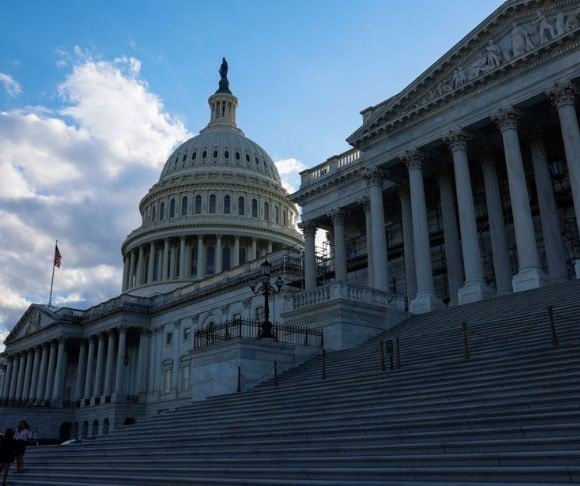The US Senate is the ultimate focus of this year’s congressional elections. While most pundits and pollsters agree that the House will swing to Republican control, prognostication on how the upper chamber will manifest remains the subject of contention. Countless column inches have been written to fathom the various complexities of the important races, but in reality, the formula for the GOP is quite simple: hold five and flip one.
 Every two years, roughly a third of Senate seats come up for election; during the current season, the electoral math happens to favor President Joe Biden’s party. Republicans are very much playing defense for a number of high-profile races. To break the 50-50 deadlock, the GOP will have to successfully hold on to five battleground seats (Florida, North Carolina, Ohio, Pennsylvania, and Wisconsin) and make a net gain of one seat – most likely either Nevada or Georgia, with Arizona as an outside chance.
Every two years, roughly a third of Senate seats come up for election; during the current season, the electoral math happens to favor President Joe Biden’s party. Republicans are very much playing defense for a number of high-profile races. To break the 50-50 deadlock, the GOP will have to successfully hold on to five battleground seats (Florida, North Carolina, Ohio, Pennsylvania, and Wisconsin) and make a net gain of one seat – most likely either Nevada or Georgia, with Arizona as an outside chance.
Of course, if, for example, Democrat John Fetterman beats Republican Dr. Mehmet Oz to flip Pennsylvania’s junior seat, the GOP will need to win both Nevada and Arizona. So how are these contests looking, and what does the polling tell us?
The Senate Holds
North Carolina: In the race to replace outgoing GOP Sen. Richard Burr, Rep. Ted Budd (R) faces Democrat Cheri Beasley. Dems have not won a Senate seat here since 2008, and the state has opted for Donald Trump twice, but that doesn’t mean there isn’t a hint of purple. Polling gives Budd an aggregate lead of 1.6%, according to RealClearPolitics. However, not all polls are created equal. If lesser quality polling (for example, those that survey Registered Voters instead of Likely Voters or poll less than 1,000 individuals) is removed from the equation, Budd’s advantage is doubled.

J.D. Vance (Photo by Jeff Swensen/Getty Images)
Ohio: Venture capitalist and Hillbilly Elegy author J.D. Vance is tackling Rep. Tim Ryan (D) to replace GOP Sen. Robert Portman. Vance has received outsized media coverage after being closely linked with former President Donald Trump. The author has only a 1.2% aggregate lead over Ryan, making many pundits gasp with anticipation over an upset swing to blue. But once again, it is worth considering the quality of polling. Adjusted for voter likelihood and response size, Vance’s advantage almost triples.
Pennsylvania: The hotly contested PA race between Democrat John Fetterman and TV’s Dr. Mehmet Oz has Republicans pulling hair. Oz is widely regarded as at best a poor candidate and at worst a carpetbagger from New Jersey with ties to Turkey’s President Recep Erdoğan. Not a single poll has thus far favored the GOP hopeful, with Fetterman holding an aggregate advantage of more than 4%. However, questions abound regarding Fetterman’s physical health after a recent stroke, and his campaign events have been fraught with stumbled speeches and bizarre non-sequiturs. His support of Vermont Sen. Bernie Sanders and his openly socialist politics may also be a drag factor come Nov. 8.
Wisconsin: Despite early excitement surrounding Democrat hopeful Mandela Barnes in the Wisconsin Senate race, recent polling has swung toward incumbent Sen. Ron Johnson. The GOP senator has been walking a fine line on the abortion debate and has run a reasonably subdued campaign, making it difficult for Barnes and his media supporters to gain leverage. Johnson presently has a 2.3% advantage, and betting markets make him a 4/9 favorite.
Florida: Incumbent Sen. Marco Rubio is facing a challenge from Democrat hopeful Val Demings. Polling is heavily in Rubio’s favor, with just a single survey from early August handing Demings a lead. Betting markets also back the GOP senator as the 1/6 favorite. Although pundits in the left-leaning media insist this state is in play, it is highly unlikely (though not impossible) that Democrats will take this seat.
The Senate Flips
Georgia: When Democrat Raphael Warnock won this seat in a January 2021 special election, Republican hopes of controlling the Senate were dashed. Rather than a safe, politically minded candidate, however, local football legend Herschel Walker stepped into the race to flip the Peach State back to red. Some early mistakes cost Walker a lot of support, and although he appears to have learned some valuable lessons on the campaign trail, it may be too late to gain enough momentum before polling day. Warnock maintains a fragile 0.7% lead and is favored by the bookies to win.

Blake Masters (Photo by Brandon Bell/Getty Images)
Arizona: Republican Blake Masters is set to do battle with incumbent Democrat Mark Kelly in one of the most watched races in the country. Kelly has a clear four-point advantage and has not polled below Masters in any single survey. Despite this, the GOP is banking on the border issue to convince voters to go red in November.
Nevada: Nevada appears to be Republicans’ best hope for a pick-up this cycle. Since the beginning of September, every poll has favored Republican Adam Laxalt against incumbent Democrat Catherine Cortez Masto; he presently has an aggregate lead of 2.2%. With good local name recognition, Laxalt is expected by the betting markets to flip this seat, but only by the slimmest of margins.
Too Many Moving Parts?
If it seems that all the hard work in these congressional midterms has to come from the GOP, that would be a fair assessment. Republicans are fighting an uphill battle, but the contenders are not necessarily outmatched. President Biden is polling in the mid-to-low 40s; Vice President Kamala Harris is shockingly even lower. While the president has had some legislative victories, the death by a thousand cuts to his signature student debt forgiveness program appears to be making him more enemies than waiting two years to implement it did. The party leadership will undoubtedly have some impact on the congressional election results.
Republicans have a path to Senate victory, albeit a narrow one. Whether the party hopefuls choose to focus primarily on these key races or spread their campaign efforts and cash across the nation in races that require no real support (for example, Missouri, where the GOP candidate is 11 points ahead) is entirely within their purview. Either way, the electoral math is simple, and so, too, should be the method to make the equation work.




